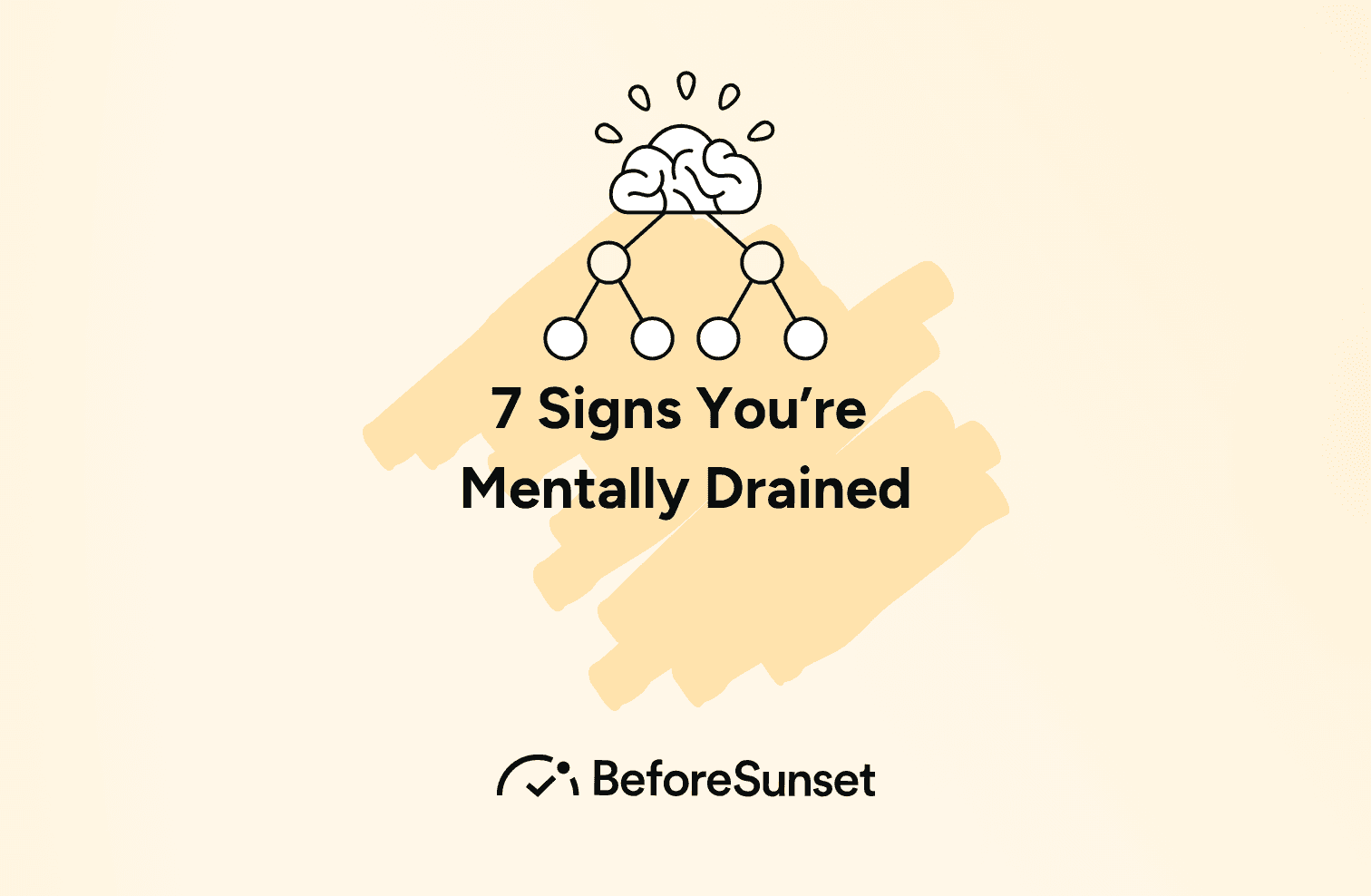Many people suffer mental tiredness at some time in their lives, and it is a normal occurrence. Feeling mentally drained may negatively affect your general wellbeing, regardless of whether you're coping with personal problems, work-related stress, or other difficulties.
The negative effects of job-related stress were indicated by nearly 3 in 5 employees, and these included a loss of enthusiasm, drive, or energy (26%) and a lack of effort at work (19%). Moreover, a staggering 44% of people experienced physical fatigue—a 38% rise from 2019—while 36% claimed cognitive tiredness and 32% cited emotional exhaustion.
We'll look at 11 symptoms of mental tiredness, including both physical and emotional ones, in this post. We'll also offer pointers and methods for overcoming mental fatigue and regaining equilibrium and vigor.
This blog is for you if you've been feeling worn out, overburdened, or burned out recently. You may begin to feel more energized, focused, and resilient in your everyday life by identifying the symptoms of mental weariness and taking action to treat them.
What is Mental Exhaustion, and What Does it Mean to be Mentally Drained?
A state of great physical and mental tiredness known as mental exhaustion, often referred to as mental fatigue or burnout, can be brought on by extended or intense periods of stress, overworking, or difficult life situations.
When you're mentally drained, you could feel overburdened or emotionally spent and struggle to focus or finish chores. This may result in a sensation of hopelessness, a decrease in motivation, and an overall gloomy or disengaged feeling.
Several things, including stress at work, strained relationships, money troubles, health concerns, and more, can contribute to mental tiredness. While persistent mental weariness can result in more significant mental health concerns like anxiety and depression, as well as physical health problems like high blood pressure and a weaker immune system, it is crucial to recognize the symptoms of mental exhaustion and take action to address them. 48% of Americans who have jobs say they feel emotionally and physically worn out at the end of the day.
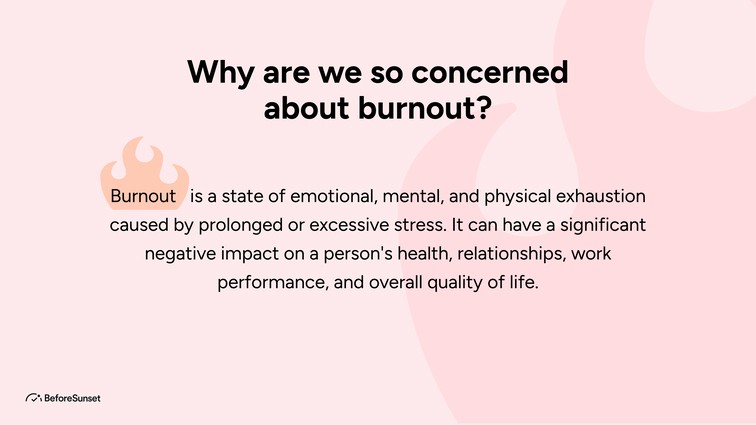
Why Are We so Concerned About Burnout?
Burnout may have serious negative effects on a person's health and capacity to do their job properly, which is why we are so concerned about it. Burnout is a condition of physical, emotional, and mental weariness brought on by a sustained exposure to stress, which is frequently brought on by job or other life events.
Burnout may cause a person to feel exhausted, overburdened, and disconnected from both their personal and professional lives. Many detrimental effects, including lower job satisfaction, decreased performance and productivity, increased absenteeism, and even physical health issues like cardiovascular disease and a weaker immune system, may result from this.
An individual's mental health can be significantly impacted by burnout, which can result in illnesses like anxiety and despair. This is due to the fact that prolonged stress and weariness can impair the body's normal stress response mechanism, resulting in an unbalanced level of neurotransmitters like dopamine and serotonin as well as chemicals like cortisol.
Considering the detrimental effects of burnout, it's critical that individuals and organizations take action to manage and avoid it. This might involve actions like making self-care a priority, setting clear work-life boundaries, asking for help from coworkers and mental health specialists, and fostering a wellness culture at work.
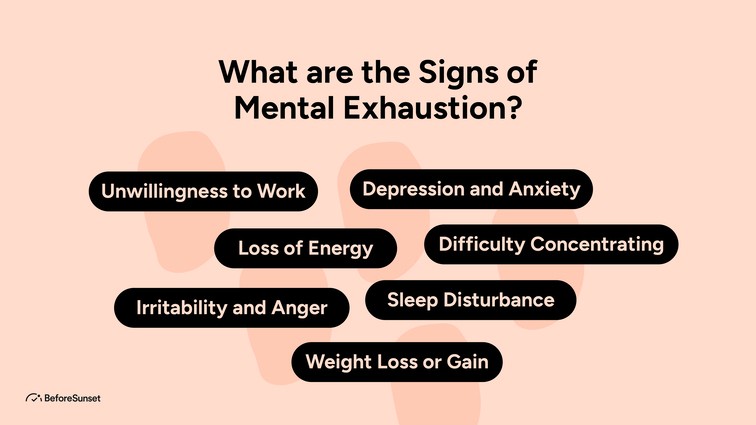
What are the Signs of Mental Exhaustion?
In 2017, 16% of workers between the ages of 15 and 75 said they were mentally exhausted at least several times a month as a result of their jobs. In 2015, this number remained at 13%. The percentage of workers who have these issues is approximately twice as high as the percentage of self-employed people.
Feeling mentally exhausted may negatively affect your general wellbeing, regardless of whether you're coping with personal problems, work-related stress, or other difficulties.
The first step in taking action to stop mental tiredness from developing into a more serious condition like burnout or depression is to become aware of the symptoms. We'll look at both the physical and emotional symptoms of mental weariness in this post.
1. Unwillingness to Work
Although a lack of motivation to work may be an indication of mental tiredness, it's necessary to take into account other causes that could be behind this behavior.
Someone who is mentally drained out may feel overburdened, uninspired, and disconnected from their work. This may result in a loss of excitement, decreased productivity, trouble focusing, and difficulty making decisions.
2. Loss of Energy
Even if you get adequate sleep, mental fatigue can leave you feeling drained and worn physically. This is due to the fact that mental weariness has been associated with hormonal imbalances, adjustments in neurotransmitter levels, and interference with the body's typical stress response mechanism, all of which can exacerbate fatigue.
3. Depression and Anxiety
It's vital to keep in mind that anxiety and depression may both be symptoms of mental tiredness as well as independent diseases with their own unique causes and symptoms.
Mental weariness can cause persistent stress and changes in brain chemistry that can result in mood abnormalities, which can contribute to the development of melancholy and anxiety. Mental exhaustion may make it difficult to deal with everyday challenges, leave one feeling overwhelmed, angry, and emotionally spent, and may even hasten the onset of melancholy and anxiety.
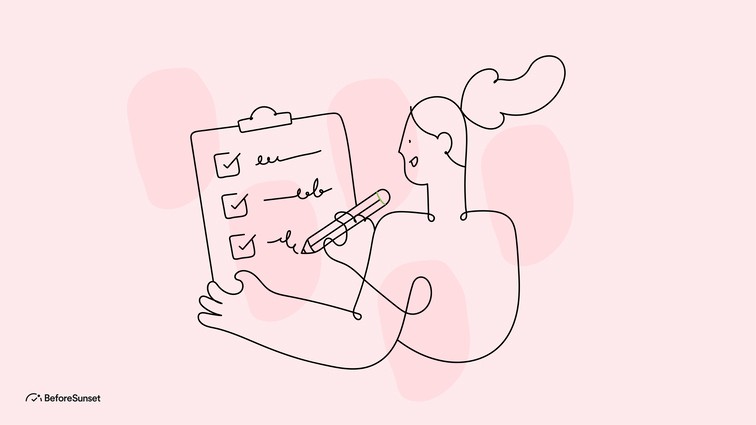
4. Difficulty Concentrating
Even if they can focus and concentrate on things in general, folks who are mentally exhausted may find it difficult to do so. Changes in hormone and brain chemistry caused by extended stress and weariness might cause this.
Other factors that might make it difficult to focus include a lack of sleep, poor diet, and various health issues that may be related to mental weariness. Ignoring inability to concentrate can lead to decreased performance and productivity, which can exacerbate emotions of weariness and stress.
5. Irritability and Anger
A person who is psychologically worn out may feel irritated, helpless, and unable to handle even little situations. This might result in agitation and wrath, which can be directed either at other people or at oneself.
6. Sleep Disturbance
Long-term stress or overwork can have a variety of effects on a person's ability to sleep.
First off, having trouble falling or staying asleep might be a sign of mental weariness. Anxiety, concerns, and racing thoughts can keep someone awake at night and prohibit them from receiving the restorative sleep they require.
Second, mental weariness may make a person feel overly exhausted throughout the day, which can make it challenging for them to focus and efficiently complete their daily activities. The subsequent increase in tension and worry might further impede sleep.
Last but not least, ongoing sleep deprivation can hasten the onset of mental fatigue or burnout. Lack of sleep may have an impact on a person's mood, cognitive ability, and general well-being, making it more challenging for them to handle stress and manage their responsibilities.
7. Weight Loss or Gain
Changes in appetite and eating habits may occur when a person is suffering from mental weariness or burnout. Others may use food as a coping method and put on weight, while other people may lose their appetite and lose weight as a result.
In addition, hormonal changes brought on by mental weariness may effect metabolism and result in weight gain or reduction. For instance, ongoing stress can raise cortisol levels, which can result in weight gain, especially around the middle.
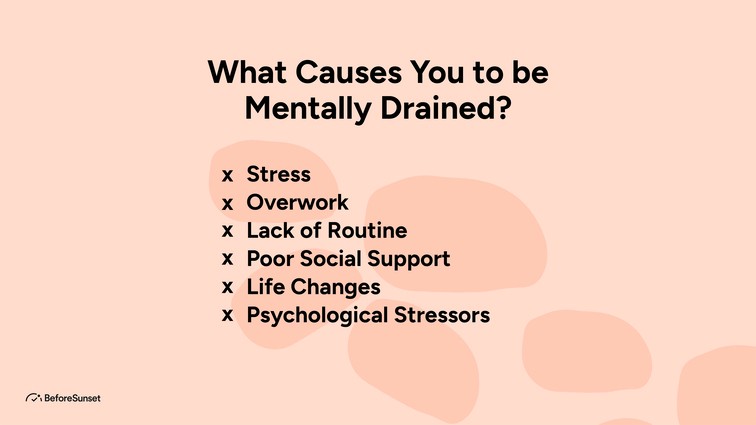
What Causes You to be Mentally Drained?
Burnout, or mental fatigue, is a condition of emotional, bodily, and mental depletion brought on by continuous stress or overworking oneself. It may have major effects on a person's mental and physical health and can impact anybody, regardless of age, job, or lifestyle.
In addition to exhaustion, irritability, anxiety, melancholy, sleep difficulties, and changes in eating and weight, burnout symptoms can range considerably. We will examine some of the typical contributors to mental tiredness in this post, such as stress at work, personal and family obligations, social isolation, and trauma.
Knowing what contributes to mental fatigue may help people manage their stress, put self-care first, and avoid burnout from becoming a recurring problem.
1. Stress
One of the most frequent causes of mental fatigue or burnout is stress. A person's physical and mental health may suffer if they are subjected to chronic or protracted stress. Several factors, including job, education, relationships, issues with money and one's health, can cause stress. The following are a few ways that stress can lead to mental fatigue:
A person's body releases the hormone cortisol while they are under stress, which primes the body to react to a perceived threat. Cortisol overexposure can cause various health issues, such as physical and mental exhaustion.
Stress can make it hard to fall or remain asleep, which can result in long-term sleep deprivation. A person may experience fatigue, irritability, and decreased stress tolerance as a result of this.
While under stress, a person may have trouble focusing, making choices, or remembering details. As a result, tasks may become more challenging to finish and feelings of tiredness and overwhelm may worsen.
Emotional weariness can include emotions of cynicism, detachment, and less empathy. Prolonged stress can also cause emotional exhaustion.
It's crucial to remember that not all stress is harmful, and that a certain amount of stress may really assist a person stay motivated and focused. To avoid burnout, it's crucial to identify when stress is getting too much and take action to control it. This can entail altering your daily schedule, asking friends or a mental health professional for help, or finding methods to unwind and recharge.
2. Overwork
Another frequent factor in mental fatigue or burnout is overwork. Physical and mental exhaustion might result from working long hours, taking on too many duties, or feeling under constant pressure to perform well. The following are a few ways that mental weariness can result from excessive work:
Lack of rest and recovery: People may not have enough time for rest and recovery if they work long hours or take on too many obligations. Chronic sleep deprivation and a lack of time for self-care activities like exercise, socializing, or engaging in hobbies might result from this.
High pressure and responsibility: Being overworked can result in more pressure and responsibility, which causes overwhelm and anxiety. It might be challenging to concentrate, maintain motivation, or make judgments when one feels as though they are carrying a heavy weight.
Reduced job satisfaction: Working too much can result in low levels of job satisfaction as well as feelings of indifference or disengagement. The effort to find meaning or purpose in one's job can have a negative impact on productivity and raise stress levels.
Risk of physical health issues rising: Physical health issues including heart disease, obesity, and diabetes might rise due to overwork. As a person attempts to manage both their health and their professional obligations, this can cause additional stress and tiredness.
3. Lack of Routine
Lack of consistency may also contribute to mental exhaustion or burnout. Feelings of overwhelm, procrastination, and difficulty defining priorities might emerge from a lack of discipline or regularity in one's everyday life. These are some examples of how a lack of consistency might cause mental fatigue:
Someone may find it challenging to effectively manage their time if there is no structure or routine throughout the day. This may lead to procrastination, missed deadlines, and increased stress.
A person may experience a sense of purposelessness or lack of direction in their daily life if there is no regularity or organization. This might lead to a lack of motivation, boredom, or disinterest.
Without a routine, one can be forced to make multiple judgments during the day, which could make them more susceptible to decision fatigue. Because of this, it could be more challenging to focus, make decisions, and carry on working.
When a person lacks consistency, it might be harder to prioritize self-care activities like exercise, a healthy diet, and resting. Burnout and an elevated risk of physical and mental exhaustion can come from this.

4. Poor Social Support
Lack of social support may also be a factor in mental exhaustion or burnout. Those who lack social support may feel alone, overworked, and unable to cope with stress. These are a few instances when a lack of social support might aggravate mental fatigue:
Increased stress: Those who lack social support might not have anybody to turn to for aid at difficult times or support with regular tensions. This might lead to increased stress and a decreased ability to handle stress.
Perspective loss: Without social support, a person would be unable to access a range of opinions or ideas, which might lead to feelings of loneliness and a decline in one's ability to solve problems.
Insufficient social support: It can make a person feel insufficient and have a decreased feeling of self-worth, which can lead to a decrease in self-esteem. This might lead to increased stress and a decreased ability to handle stress. In the absence of social support, a person may be more susceptible to mental health problems including sadness and anxiety.
5. Life Changes
Changes in one's life can also lead to mental weariness or burnout. Life transitions such as starting a new career, moving to a new place, ending a relationship, or losing a loved one may be stressful and upsetting. Life transitions might create mental weariness in the following ways:
Increased stress: Even positive life changes, such as a new job or relocating to a new place, can be stressful. Adapting to new settings, meeting new people, and establishing new habits may all be difficult and stressful.
Lack of stability: Changes in a person's life can upset their sense of stability and regularity, leading to feelings of uncertainty and overwhelm.
Reduced self-esteem: Life transitions can cause feelings of inadequacy or self-doubt, especially if a person is trying to adapt or cope with the change.
Increased risk of mental health problems: Life changes might raise a person's chance of acquiring mental health disorders such as sadness and anxiety.
6. Psychological Stressors
Psychological stressors are another aspect that may contribute to mental weariness or burnout. Psychological stressors are the many emotional or psychological components that might induce stress and overload. Psychological stress can cause mental weariness in the following ways:
Negative thought patterns such as catastrophizing, rumination, and self-criticism can increase stress and make it difficult to cope.
Perfectionism can cause people to get anxious because they put too much pressure on themselves to perform well and fulfill lofty goals.
Previous traumas, such as child abuse or neglect, can result in long-term emotional distress and an increased risk of developing mental health problems.
Interpersonal problems, such as arguments with family members or coworkers, can be a persistent source of stress and emotional agony.
Office stressors, such as excessive tasks, a lack of autonomy, or arguments with coworkers, can produce stress and overload.
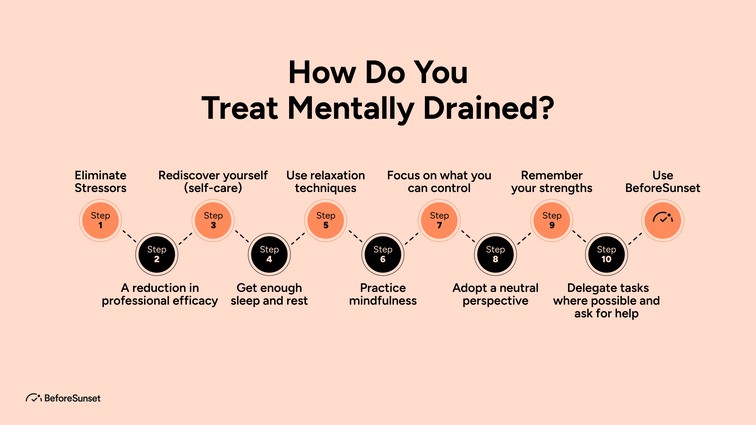
How Do You Treat Mentally Drained?
For many people, especially those who are coping with high levels of stress, overwork, or other demanding conditions, mental tiredness or burnout is a frequent feeling. Mental weariness may cause a variety of unpleasant physical and emotional symptoms, such as fatigue, irritation, and sadness, if it is not addressed.
Thankfully, there are several efficient therapies for mental weariness that may assist people in regaining their vitality and wellbeing. We'll talk about some of the best self-care practices, counseling, and dietary adjustments for treating mental weariness in this conversation.
Whether you are suffering from mental tiredness yourself or are assisting someone who is experiencing burnout, this book will provide you insightful information and practical suggestions for encouraging recovery and rejuvenation.
Step 1: Eliminate stressors
Treatment for mental fatigue or burnout may involve removing stresses. Your body and mind are trying to inform you that you need to rest and recharge when you're psychologically exhausted.
It may be good to start by figuring out the causes of stress in your life. Do you ever feel overburdened or concerned because of specific individuals, circumstances, or obligations? After you've determined what these stresses are, you may begin to consider how to lessen or remove them.
The following actions can be taken to relieve mental fatigue and get rid of stressors:
Finding the cause of your stress may be difficult, but doing so is the first step in lowering it. Write down each stressor after giving it some thought.
When you've identified your stresses, determine which of them are under your control and which are not. Concentrate on the sources of stress that you can manage.
Have a strategy to get rid of or minimize your worries. This can entail establishing limits with particular people or decreasing your workload.
Self-care is crucial for stress management. Take care of yourself by getting adequate sleep, working out frequently, eating healthily, and doing things you like.
If you're finding it difficult to control your stress on your own, don't be hesitant to ask for help. Consult with friends and family, or think about visiting a mental health professional.
Keep in mind that removing stresses is a continuous effort rather than a quick remedy. While attempting to alleviate mental weariness and lower your stress levels, it's crucial to be patient and gentle to yourself.
Step 2: A reduction in professional efficacy
Keeping up with personal or professional obligations might be difficult when one is suffering from mental weariness or burnout. It's crucial to take action to address the underlying cause of the fatigue and implement the required adjustments to reclaim wellbeing. This may entail taking time off work, reviewing your priorities, establishing achievable objectives, and engaging in self-care.
To manage expectations and lessen stress, it's critical to be open and honest with loved ones and coworkers about your requirements and constraints. A mental health professional, family members, or friends may also be a great source of advice and information.
Step 3: Rediscover yourself (self-care)
It's crucial to take some time to find oneself and engage in self-care when someone is suffering from mental weariness or burnout. This is partaking in practices that support mental and emotional wellness, such as yoga, meditation, or time spent in nature. It also entails maintaining physical health through a balanced diet, sufficient rest, and consistent exercise. In addition to these self-care routines, it's crucial to set aside time for reflection about one's beliefs, hobbies, and aspirations.
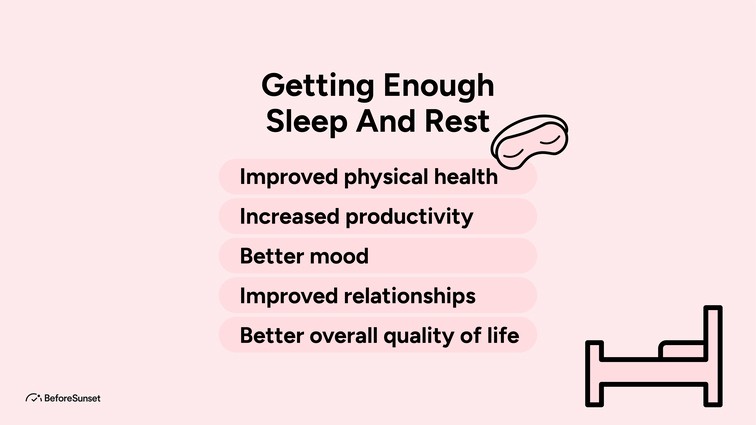
Step 4: Get enough sleep and rest
Treatment for mental tiredness and burnout depends on getting adequate sleep and rest. It may be difficult for someone to fall asleep or remain asleep when they are feeling mentally exhausted, which can make them feel more worn out and stressed. It's crucial to create a sleep-friendly atmosphere by reducing noise, light, and other distractions, as well as to set a regular bedtime and wake-up schedule.
In addition, taking regular breaks during the day and, if feasible, taking time off of work can assist lower stress and encourage rest and relaxation. It's also crucial to give relaxation-promoting activities, like reading, bathing, and being outside, top priority.
Step 5: Use relaxation techniques
Mental fatigue and burnout can be effectively treated using relaxation techniques. Deep breathing, gradual muscle relaxation, and mindfulness meditation are all methods that can help people relax and reduce stress. These methods function by assisting in controlling the body's reaction to stress, such as lowering blood pressure, heart rate, and muscular tension.
To assist counteract the consequences of chronic stress, it's crucial to develop a regular practice of relaxation methods, even if it only lasts a little while each day. Other activities that can aid in relaxation and stress reduction include yoga, tai chi, and being outside.
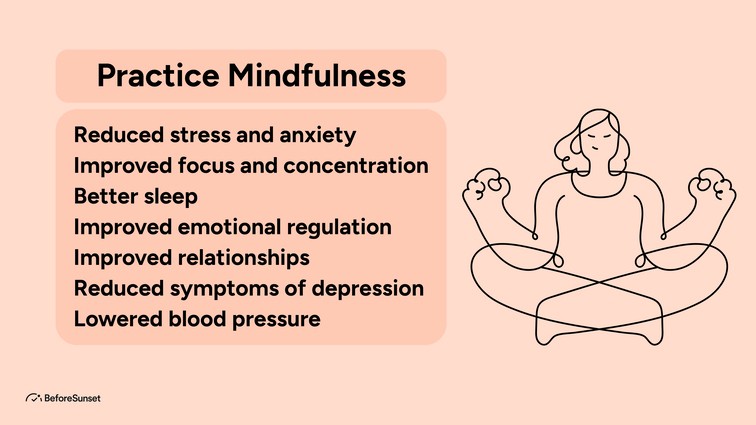
Step 6: Practice mindfulness
Mental burnout and tiredness may both be effectively treated by engaging in mindfulness practices. The practice of mindfulness is focusing solely on the here and now, without judgment or diversion, and it can help lower stress levels and improve mental health. Yoga, meditation, or simply taking a few minutes to pay attention to your breathing while observing your thoughts and feelings are all ways to practice it.
Regular mindfulness practice can help people become more conscious of their thoughts and emotions as well as grow in self-awareness and compassion for themselves. This can provide a more optimistic attitude on life and help lessen emotions of worry, despair, and stress. Also, mindfulness can enhance cognitive abilities like memory and concentration, which can aid people in managing their obligations both at work and at home.
Step 7: Focus on what you can control
It's crucial to concentrate on your controllable actions when you're feeling mentally exhausted or burned out in order to regain equilibrium and well-being. This is determining the aspects of your life that you can control, such as your thoughts, actions, and responses, and concentrating on these aspects rather than letting outside pressures overwhelm you.
By concentrating on what you have control over, you may divide more complex issues into simpler, more manageable activities and get a sense of empowerment and action. This can lessen helplessness-related sentiments and enhance general well-being. To manage stress and foster emotional well-being, it can also be beneficial to practice self-compassion and reframe unfavorable beliefs.
Step 8: Adopt a neutral perspective
Treatment for mental tiredness and burnout may involve adopting a neutral viewpoint. Instead than being emotionally involved in events and passing judgment, this entails taking a step back and viewing things objectively. People can lessen the influence of unfavorable thoughts and feelings by taking a neutral stance, which can ease tension and foster a sense of serenity.
Also, it can assist people in making more sane judgments and preventing themselves from being overcome by outside circumstances. Also, having a neutral viewpoint enables people to perceive things more objectively and with less judgment, which helps to foster self-compassion and lessen self-criticism.
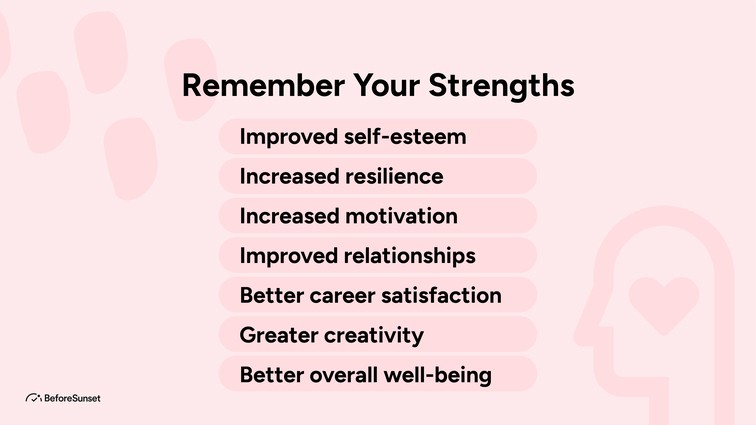
Step 9: Remember your strengths
A potent remedy for mental fatigue and burnout is to keep in mind your strengths. When psychologically exhausted, it is simple to dwell on flaws and past mistakes, which can heighten tension and self-doubt. By putting more emphasis on your strengths, you may develop self-efficacy and confidence, which can help you overcome obstacles and accomplish your objectives.
Considering your prior achievements and triumphs as well as getting input from others might help you identify your strengths. After you've determined your talents, it's critical to use them in daily interactions, whether at work or in interpersonal interactions. This can lessen stress and burnout-related sensations while increasing your sense of fulfillment and purpose.
Focusing on your strengths can also help you access your inner resources and adopt a more optimistic attitude on life, which can help you feel better overall and be more resilient.
Step 10: Delegate tasks where possible and ask for help
In order to combat mental weariness and burnout, it might be extremely important to delegate duties where feasible and seek for assistance. Many people who are mentally exhausted frequently believe they must do everything on their own, which can result in a feeling of overwhelm and tiredness.
People can lessen their workload and concentrate on what matters most by assigning chores to others and soliciting assistance. This may lessen stress and encourage a more harmonious balance between work and personal life. Identifying duties that may be delegated to others, such as administrative work or errands, or assigning responsibilities to coworkers or members of a team at work are examples of delegation.
When assigning jobs, it's critical to communicate clearly and to make sure the people receiving the work have the tools and support they need to be successful. Asking for assistance when necessary may also be a crucial step in overcoming mental tiredness and burnout. This may entail talking freely about your wants and challenges with others, whether it be coworkers, friends, or family.
People can attempt to overcome mental weariness and burnout while also enhancing their capacity to handle stress and sustainably carry out personal and professional responsibilities by assigning duties to others and soliciting assistance.
The Body-Mind Connection: How Physical Activity Boosts Your Mental Well-Being
We all know the benefits of physical activity for our physical health. But did you know it can also significantly impact our mental energy and overall mental well-being? Here's how:
The Science Behind the Sweat:
Physical activity isn't just about burning calories. It triggers the release of endorphins, natural mood-lifters in the brain. This can combat feelings of depression and anxiety, common symptoms of many mental health conditions.
Sharpening the Tools:
Regular exercise has been shown to improve cognitive function. Increased blood flow to the brain during physical activity can enhance cognitive activities like memory, focus, and concentration. This benefit can even persist into old age.
Stress Relief Powerhouse:
Physical activity is a powerful stress reliever. Exercise helps manage emotional stress by promoting the release of tension and pent-up energy. This can lead to a calmer state of mind, improved sleep quality, and a greater sense of well-being.
Building Resilience:
Regular physical activity can improve our mental resilience. By challenging ourselves physically and pushing through discomfort during exercise, we develop a sense of accomplishment and build mental fortitude. This can translate to increased resilience in dealing with life's challenges.
Finding the Right Fit:
The good news is that you don't need to become a gym rat to reap the mental benefits of physical activity. Even moderate exercise, like brisk walking, swimming, or dancing, can significantly impact your mental effort and mood.
Incorporating Movement into Your Life:
Find activities you enjoy: Choose physical activities you find fun and engaging, making them easier to stick with long-term.
Start small and gradually increase intensity: Don't overwhelm yourself. Begin with shorter durations and gradually increase intensity as your fitness improves.
Find a workout buddy: Having a friend or partner to exercise with can provide motivation and accountability.
Remember, consistency is key. Even small amounts of physical activity most days of the week can significantly enhance your mental well-being. So, lace up your shoes, hit the track, and watch your brain and body thank you for it!

BeforeSunset AI: Your Ally Against Burnout
Feeling mentally fried from juggling endless tasks? BeforeSunset AI can be your secret weapon in the fight against burnout.
Reduce Mental Overload:
Simplify, Automate, Conquer: Free up valuable mental space by streamlining tasks and automating repetitive processes with BeforeSunset's intuitive tools. Focus your energy on high-impact work that truly matters.
Prioritize for Peace of Mind:
Organize and Conquer: Utilize BeforeSunset's task management and scheduling features to structure your workday, prioritize effectively, and avoid overcommitting. This clear roadmap minimizes stress and keeps mental fatigue at bay.
Invest in Your Wellbeing:
BeforeSunset AI empowers you to work smarter, not harder. Download it today and experience the difference a mindful approach to productivity can make!

